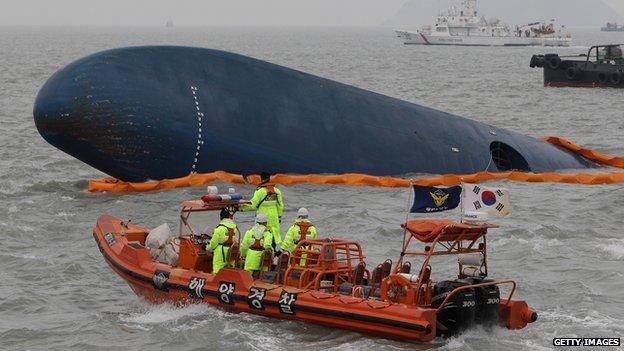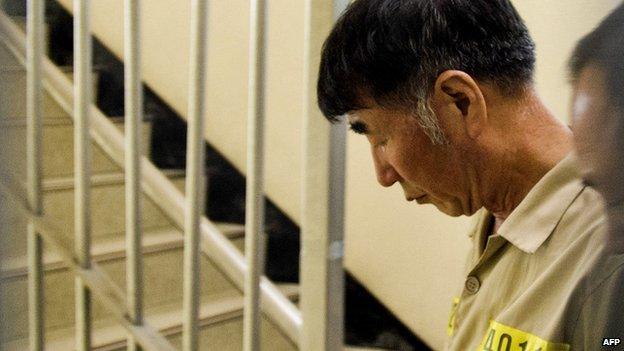South Korea ferry: Court begins hearing evidence
- Published
John Sudworth reports on the start of the trial, which began with technical evidence
A South Korean court has begun hearing evidence in the trial of the captain and 14 crew members of a ferry that sank in April, killing more than 300.
The crew are charged with negligence and abandoning ship. The captain and three officers are also charged with "homicide through wilful negligence".
Captain Lee Joon-sok's lawyer suggested he would contest the murder charge because there was no intent to kill.
The Sewol ferry capsized and sank on 16 April, with 476 people on board.
A total of 304 people are believed to have died. Divers have conducted an extensive search of the sunken ship to recover their bodies and on Tuesday retrieved the remains of a female passenger.
That brings the number of bodies recovered to 293, with 11 people still unaccounted for. Most of those on board the ferry were teenagers on a school trip.
Prosecutors say the ship capsized because it was overloaded, with cargo improperly stowed. Five executives from ferry operator Chonghaejin Marine are also facing charges.
The tragedy has caused shock and outrage in South Korea.

The Sewol ferry capsized and then sank off South Korea's southern coast on 16 April

The Sewol ferry crew, including captain Lee Joon-seok, face multiple charges amid public anger
The crew have been accused of prioritising their own safety over that of passengers, and also of causing more deaths by instructing people to remain in their cabins instead of evacuating the ship.
They are being tried at the district court in the southern city of Gwangju.
But, reports the BBC's John Sudworth from the court, questions are being asked about the possibility of a fair trial given the wide assumption of guilt in the South Korean media.
Students who survived the sinking are to testify next month at a court close to their homes near Seoul, instead of at the court in Gwangju, it was also announced on Tuesday.
The decision was aimed at minimising further stress to the students, court officials said.
Meanwhile President Park Guen-hye, whose government has also faced tough criticism over the disaster, suffered another blow when her second nominee for prime minister withdrew from consideration.
The incumbent, Chung Hong-won, has tendered his resignation over the handling of the ferry disaster.
But Ms Park's first choice as his replacement withdrew amid questions over his finances, and her second, Moon Chang-keuk, over controversial Japan-related comments that he made.
In 2011 Mr Moon had described Japan's 35-year colonisation of the Korean peninsula as "God's will".